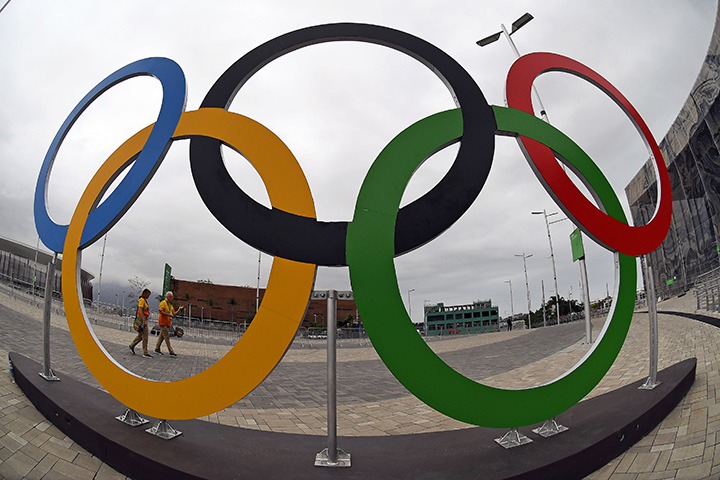With cities like Toronto and Quebec City having (for now, anyway) abandoned the idea of hosting the Olympics, it leaves Calgary as Canada’s lone remaining five-ring dreamer.

A formal decision as to whether to pursue the 2026 Winter Olympics hasn’t yet been made, but Calgary city council seems to be inching in that direction. Council budgeted $5 million to create a Bid Exploration Committee (CBEC), and that committee will make a final recommendation next month.
Earlier this week, CBEC presented city council with their estimate of what the cost of hosting the Games would be: $4.6 billion. CBEC anticipates revenue of just over $2 billion, leaving governments on the hook for about $2.5 billion. The expected GDP boost would be somewhere between $2.2 billion and $2.6 billion — less than the total amount of money being spent, and basically about as much as the net government contribution.
READ MORE: Two-thirds of area residents support an Olympic bid by Calgary: survey
Alternatively, we could simply drop $2.5 billion out of a helicopter and have basically the same GDP impact. What’s the point of all this?
In an unusual move, the International Olympic Committee (IOC) itself jumped in with a statement to try and reassure everyone that, of course, an Olympics in Calgary could be done in a very cost-effective way. However, the IOC’s track record suggests very much the opposite. Perhaps the IOC is rattled by the growing list of cities opting out of the bidding process.
The price tag laid out for Calgary is steep enough as it is, at a time when governments are not exactly fat in the wallet. However, taking on the Olympics means taking on considerable risk. The track record shows that the costs are greater than expected, while the impact and the benefits are less than expected.
And while the rest of Canada might be inclined to shrug or roll their eyes at Calgary’s flight of fancy, they should be worried, too. As Calgary’s mayor has already suggested, without a significant funding component from the province and the federal government, this bid likely won’t happen. So that makes all of this more than just Calgary’s problem.
WATCH BELOW: The 2026 Winter Olympics would cost Calgary $4.6 billion to host

Canada’s last Olympic Games can serve as a warning on this point. In 2006, B.C.’s auditor general pegged the cost of hosting the Olympics at $2.5 billion, yet the actual price tag of Vancouver 2010 ended up being somewhere between $7 billion and $9 billion. Moreover, the B.C. government has predicted a $10-billion GDP boost, which turned out to only be about $2.3 billion.
Or take the 2015 Pam-Am Games in Toronto. Last year, Ontario’s auditor general concluded that Games delivered a “significantly higher cost to Ontario taxpayers than originally planned” — about $342 million or so.
It was a similar story in the U.K., where the original bid for the London 2012 Olympics forecast a budget of £2.4 billion, but later more than tripled to £9.3 billion. In Massachusetts, a state-commissioned report into the abandoned Boston 2024 bid found that construction costs were underestimated to the tune of $970 million and transportation costs were underestimated by as much as $1.3 billion.
- Train goes up in flames while rolling through London, Ont. Here’s what we know
- Budget 2024 failed to spark ‘political reboot’ for Liberals, polling suggests
- Wrong remains sent to ‘exhausted’ Canadian family after death on Cuba vacation
- Peel police chief met Sri Lankan officer a court says ‘participated’ in torture
Another relevant point driven home by that report was the fact that the IOC “does not bear any of the financial risks associated with the Olympic Games …. the taxpayers of the Commonwealth of Massachusetts would be the ultimate risk bearers.”
READ MORE: No longer a combo: McDonald’s ends Olympic sponsorship deal
Two major studies last year help to underscore this broader issue. Researchers at Oxford University found that the Olympics “have the highest average cost overrun of any type of mega-project” and that “cost overrun is found in all Games, without exception; for no other type of mega-project is this the case.”
In a separate study, American economists Robert Baade and Victor Matheson found that “the overwhelming conclusion is that in most cases the Olympics are a money-losing proposition for host cities” and that bidding for the Games represents an “increasingly poor investment decision on the part of cities.”
We need governments at all levels to be smart with how taxpayer dollars are spent. When it comes to the Olympics, that should mean passing on the torch.
Rob Breakenridge is host of “Afternoons with Rob Breakenridge” on Calgary’s NewsTalk 770 and a commentator for Global News.








Comments